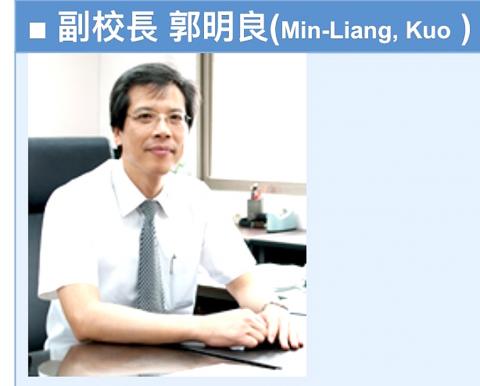National Taiwan University (NTU) professor Kuo Min-liang (郭明良), who has been embroiled in an academic fraud scandal since last month, was yesterday accused of accepting nearly NT$7 million (US$220,105) in exchange for letting other academics be listed as coauthors on papers written by his research team.
The Chinese-language Next Magazine, citing an unnamed source, yesterday reported that from October 2002 to December 2014, Yen Men-luh (嚴孟祿), a doctor at National Taiwan University Hospital’s Department of Obsterics and Gynecology, made 16 check or wire payments to Kuo’s account totaling NT$6.73 million.
Online academic forum PubPeer last month said that Kuo’s team may have forged 11 articles, including four that listed NTU president Yang Pan-chyr (楊泮池) as a coauthor.

Photo courtesy of Kaohsiung Medical University’s Web site
Yen could have acted as a middleman who helped other academics be listed as coauthors in the articles, Next Magazine said.
Minister of Education Pan Wen-chung (潘文忠) yesterday expressed surprise at the allegation.
The ministry will instruct the Department of Civil Service Ethics to investigate and forward its findings to prosecutors, Pan said.
Department of Higher Education Director Nicole Lee (李彥儀) said that the university would submit a report on the allegations by the end of this month.
Although Kuo had tendered his resignation, which is still pending, the government research grants issued to Kuo and his team could be reclaimed if the allegations were found to be true, Lee said.
Yen denied the allegation in an interview with the magazine, saying that he offered to lend the money to Kuo to help him pay a mortgage.
“Even though Kuo is a professor, he had not been in an ideal financial situation,” Yen was quoted as saying.
Yen said that he and Kuo were friends since high school and that he had been providing Kuo with financial assistance.
He said that the bank wires were loan repayments, adding that he has a contract for the loan signed by Kuo as proof.
NTU secretary-general Lin Ta-te (林達德) said the university would launch an investigation.
If Kuo or any other people involved in writing the papers were found to be have accepted bribes, they would be punished in accordance with the rules governing academics and public-school teachers, he said.
Additional reporting by CNA

INVESTIGATION: The case is the latest instance of a DPP figure being implicated in an espionage network accused of allegedly leaking information to Chinese intelligence Democratic Progressive Party (DPP) member Ho Jen-chieh (何仁傑) was detained and held incommunicado yesterday on suspicion of spying for China during his tenure as assistant to then-minister of foreign affairs Joseph Wu (吳釗燮). The Taipei District Prosecutors’ Office said Ho was implicated during its investigation into alleged spying activities by former Presidential Office consultant Wu Shang-yu (吳尚雨). Prosecutors said there is reason to believe Ho breached the National Security Act (國家安全法) by leaking classified Ministry of Foreign Affairs information to Chinese intelligence. Following interrogation, prosecutors petitioned the Taipei District Court to detain Ho, citing concerns over potential collusion or tampering of evidence. The

Seventy percent of middle and elementary schools now conduct English classes entirely in English, the Ministry of Education said, as it encourages schools nationwide to adopt this practice Minister of Education (MOE) Cheng Ying-yao (鄭英耀) is scheduled to present a report on the government’s bilingual education policy to the Legislative Yuan’s Education and Culture Committee today. The report would outline strategies aimed at expanding access to education, reducing regional disparities and improving talent cultivation. Implementation of bilingual education policies has varied across local governments, occasionally drawing public criticism. For example, some schools have required teachers of non-English subjects to pass English proficiency

‘FORM OF PROTEST’: The German Institute Taipei said it was ‘shocked’ to see Nazi symbolism used in connection with political aims as it condemned the incident Sung Chien-liang (宋建樑), who led efforts to recall Democratic Progressive Party (DPP) Legislator Lee Kun-cheng (李坤城), was released on bail of NT$80,000 yesterday amid an outcry over a Nazi armband he wore to questioning the night before. Sung arrived at the New Taipei City District Prosecutors’ Office for questioning in a recall petition forgery case on Tuesday night wearing a red armband bearing a swastika, carrying a copy of Adolf Hitler’s Mein Kampf and giving a Nazi salute. Sung left the building at 1:15am without the armband and apparently covering the book with a coat. This is a serious international scandal and Chinese

NEGOTIATIONS: The US response to the countermeasures and plans Taiwan presented has been positive, including boosting procurement and investment, the president said Taiwan is included in the first group for trade negotiations with the US, President William Lai (賴清德) said yesterday, as he seeks to shield Taiwanese exporters from a 32 percent tariff. In Washington, US Trade Representative Jamieson Greer said in an interview on Fox News on Thursday that he would speak to his Taiwanese and Israeli counterparts yesterday about tariffs after holding a long discussion with the Vietnamese earlier. US President Donald Trump on Wednesday postponed punishing levies on multiple trade partners, including Taiwan, for three months after trillions of US dollars were wiped off global markets. He has maintained a 10 percent